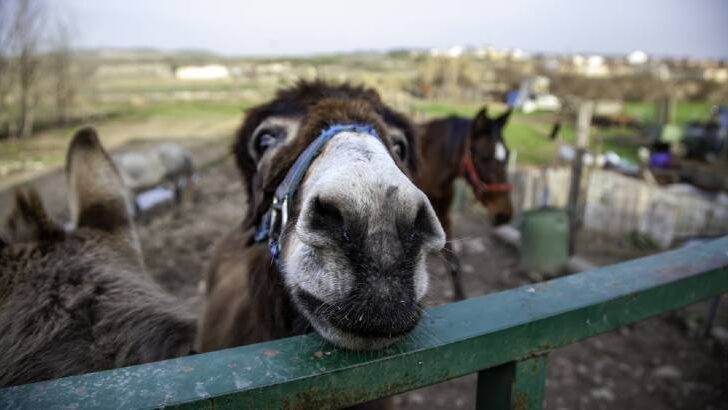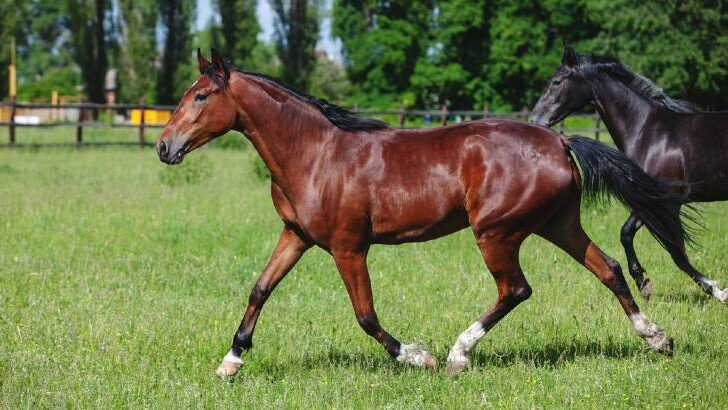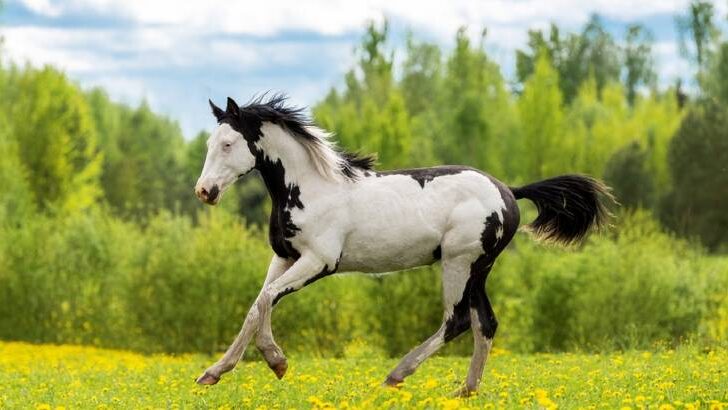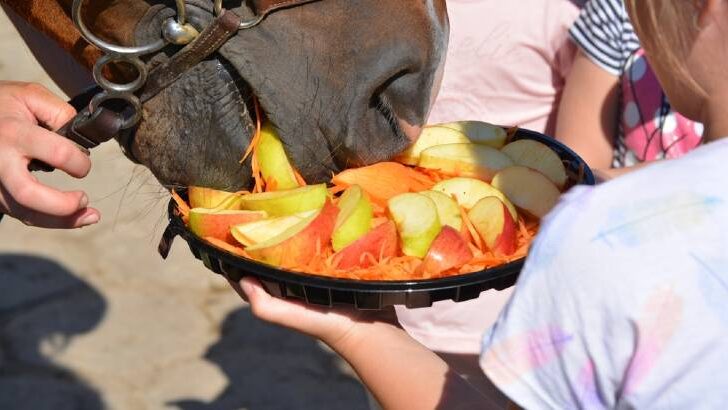Affiliate Disclaimer
As an Amazon Associate I earn from qualifying purchases. It helps me keep the website going. Thank you for your support.
Donkeys have an unenviable reputation for stubbornness, and being difficult to deal with. As a result, they have long been relegated to the position of lower-class relatives in the equine family. However, those who know them well say they’re smarter than the average horse or pony and have been unjustly maligned for centuries! Are they right? Are donkeys smarter than horses?
As it turns out – yes, donkeys do perform better (some of the time) in some of the tests we use to measure ‘smartness’ and ‘intelligence’ in animals. But, those tests, or at least the results they produce, aren’t always reliable indicators of either donkey or horse intelligence because many other variables can influence results.
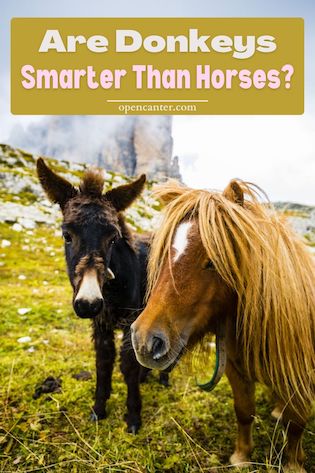
Are Donkey And Horse Intelligence Tests Valid?
‘Smart’ is a subjective concept, particularly in relation to animals. It’s ambiguous, hard to define, and difficult to measure – for many reasons. A better question may well be – do the ways in which we try to measure smartness and intelligence in animals accurately answer the question ‘Are donkeys smarter than horses’? Do they tell us much about donkey vs horse intelligence? The answer to those questions unfortunately is that often they don’t!
Smartness Is As Smartness Does
In humans, ‘smart’ is defined as being able to creatively apply acquired skills and knowledge. ‘Intelligence’ is having the capacity to think, understand, reason, and communicate.
Do they mean the same thing in animals?
Fundamentally, yes. However, animals have something called goal-directed innovativeness i.e. they’ve evolved to be as smart as they need to be to survive. This is an important distinction between human and animal smartness and intelligence.
Animals can instinctively acquire information from their surroundings. They can retain it and then apply it in ways that allow them to survive. If they couldn’t, they wouldn’t exist. However, unlike humans, they don’t naturally take it much further than that, unless of course their environment ‘encourages’ them to indulge in more ‘opportunistic’ behaviors (source).
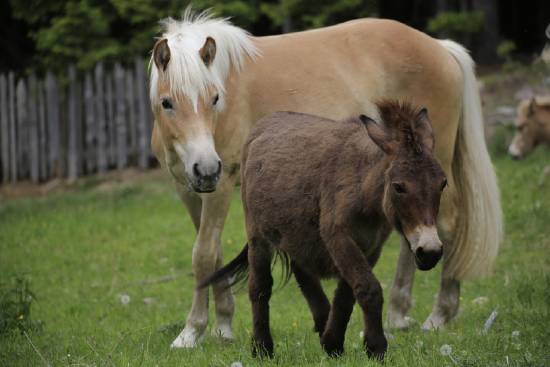
Donkey vs Horse: Different ‘Smart’ Skills
Assessing animal smartness and intelligence requires a different approach and a different set of metrics and tests than those used to measure human smartness and intelligence. Unfortunately, though they can fall short when comparing one species with another.
The fact is that donkeys and horses are 2 different species with totally different evolutionary histories. Donkeys eked out an existence in the arid African deserts, often traveling long distances to find food and water. They evolved a set of ‘smart’ skills designed to survive that existence.
Horses in contrast spent a large part of their evolutionary history living it up, relatively speaking, on the grassy plains of North America. Their major concern appears to have been a predatory meat-loving species called Homo sapiens… and no species has ever really evolved the smarts to successfully survive their dedicated onslaughts.
Consequently, horses have different attitudes and survival skills from donkeys. Take their primary defense mechanisms – horses run – very fast. Donkeys fight – very aggressively. Horses are highly reactive. Donkeys freeze. And so on…
How is Animal Intelligence Measured?
Researchers typically use the following types of metrics to assess animal smartness and intelligence:
- Memory and retention
- Trainability and learning abilities
- Ability to solve problems
- Curiosity
What Is Tested In Animal ‘Smartness’ Tests?
Exercises like conditioning tests assess an animal’s ability to learn and alter its behavior in response to negative or positive prompts. Spatial learning tasks such as negotiating mazes or locating moved openings in fences likewise test their ability to solve problems or remember solutions. Likewise, curiosity is directly linked to learning and thus to smartness.
So – how does our favorite equine stack up against its long-eared relative across these metrics? Are donkeys smarter than horses in these tests?
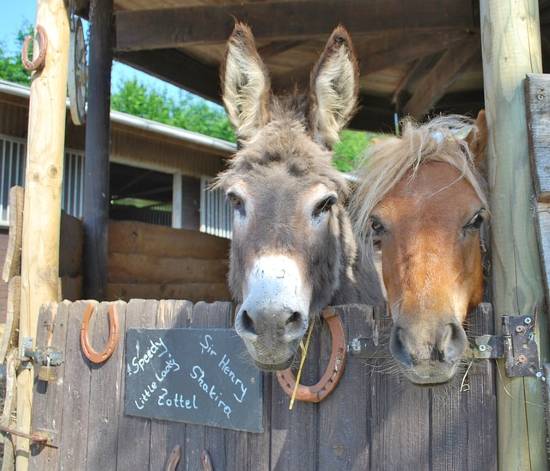
1. Memory And Retention Abilities – Donkey Vs Horse
Both donkeys and horses are highly adept at remembering and retaining information about places, like their home range or paddock (source). Importantly, they can locate food, water, and shelter and then remember where they are so they can return. They can also identify predators, recall faces, identify familiar herd members, remember routines, and repeat learned behaviors.
Whether either species is smarter at it though depends on what research you’re looking at. You’ll find results indicating that:
- Donkeys are smarter than horses at remembering things.
- Donkeys and horses are about the same at remembering things (source).
- Horses are slightly faster at learning and remembering things than donkeys (source).
Some studies have even found that groups of individuals within a species are better at observing and remembering than other groups within that same species. This in turn raises the point of how variables can affect performance in these tests (source). And determine how ‘smart’ individuals are subsequently assessed as being.
These variables include things like:
- Living conditions,
- Social interactions,
- Level of domestication, and
- Level of training
The following research project is a good example of this in action…
Study Shows Donkeys AND Ponies Outsmart Horses In Memory Tests
Researchers used puzzle tests to measure observation, working memory, retention, and spatial location memory in a group of donkeys and Esperia Ponies.
Both donkeys and ponies completed the tests successfully. They all remembered the object existed after it had been moved from view (memory retention) and where it had been hidden (spatial location memory), even after a delay of 10 seconds. So, the answer to ‘Are donkeys smarter than horses’ in these tests would be ‘No they’re not’, or at least not for these qualities.
However, when the tests were subsequently repeated with a group of Standardbreds, every single horse failed both tests! The researchers, therefore, concluded that the reason was likely their vastly different upbringing and living environment.
To explain:
Esperia Ponies are a semi-wild horse-like breed of large pony (with a reputation for being difficult to train like donkeys!). The ones used in this research had been living in an environment ‘rich in natural stimuli’. The Standardbreds on the other hand had spent their entire lives in human-controlled environments. Same species but totally different backgrounds… resulting in totally different test results!
More significantly – if these tests had only compared the Standardbreds and donkeys, the researchers would have concluded from the results that donkeys are smarter than horses (in these metrics at least).
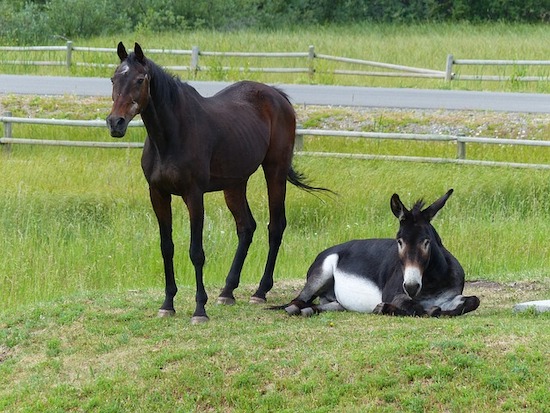
Long-Term Memory: Are Donkeys Smarter Than Horses Here?
Research by the National Institute for Agricultural Research (INRA) in Tours, France (source) found that horses and donkeys have comparable long-term memory retention. They got a group of horses and donkeys to repeat 2 tests they’d learned but last performed 2 years prior. Both donkeys and horses performed the tests perfectly.
Some Horses…! They’ll Do Anything For A Snack (Or A Puff)!
Interestingly though – when the positive (food) / negative (puff of air) incentives in the French experiment were removed, some of the horses stopped performing the activities. Notably – the less sensitive ones stopped backing up on command once the food reward was removed whilst the more sensitive ones refused to walk over the tarp when they realized the puff of air had vanished.
Researchers believe this may indicate that once incentives are removed from the equation, a horse’s natural temperament kicks in and begins to determine their behavior.
So at the end of all this, it’s probably fair to say that overall neither species is noticeably smarter than the other when it comes to powers of observation and memory.
2. Learning And Trainability: Are Donkeys Smarter Than Horses At This?
How well animals can learn and retain information affects how well they can adapt to new situations, problem-solve, and ultimately make survival decisions. Learning where a new water source is for example and then remembering its location would be an example of this.
From a human perspective, the more trainable an animal is, and the better its learning abilities are, the faster it can learn new things. This is key to determining how smart and intelligent we consider the animal to be.
How does this pan out with horses and donkeys?
Horses Take The Edge Over Donkeys In Learning Ability
According to this research, horses are faster and (marginally) better at learning than donkeys. As it turns out, there’s probably a very good physiological reason for this…
A collaborative 2020 study looked at the skull characteristics of Standardbred horses and donkeys and found that horses have larger olfactory lobes than donkeys. The olfactory lobes are the part of the brain that deals with smell.
Therefore, it’s likely that horses, with their larger olfactory lobes, can identify and process a wider range of smells than donkeys. Donkey olfactory lobes are also tilted more towards the center of the brain than those of horses, which may also affect their performance.
What does this have to do with learning abilities and training?
Well… we know from research that smell is closely linked with learning. Other research further suggests that smell may play an important role in visual memory performance as well (visual memory is ‘the ability to remember what you see’).
The inference is that if horses have larger olfactory lobes than donkeys and can probably identify and process more smells, that may be why they’re faster at learning things. And ostensibly at remembering what they see.
Horses Are Also More Trainable Than Donkeys
It doesn’t take research to know that horses are also more trainable than donkeys, who are renowned for their stubbornness. Side note – those who work with donkeys say that it isn’t so much that they’re stubborn but rather that they prefer to assess the situation first. Then, when they’re certain it’s safe to proceed, they’ll oblige. Donkeys also can’t be easily scared or intimidated into doing things!
So – when it comes to learning ability and trainability, horses definitely have an edge over donkeys.
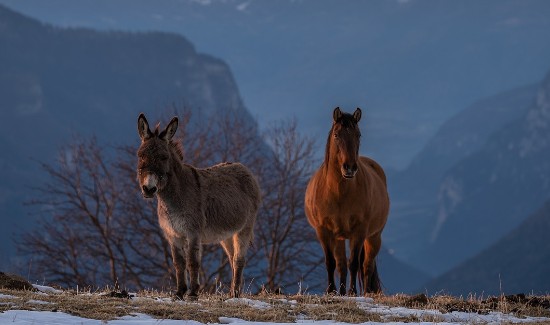
3. Horse Vs Donkey And Their Ability To Solve Problems
Now we come to the comparative problem-solving abilities of the 2 species. This ability is indicative of their ability to adapt to their surrounding and thus improve their chances of survival. When a water hole dries out, animals that can figure out they need to look for another one stand more chance of surviving than those who don’t.
Research indicates that although donkeys may be slow, they’re often more proficient at solving puzzles like ‘A not B detour tasks’. So they’d likely figure out they need to find a new water hole and start looking before horses would. That’s a tick in favor of donkeys for problem-solving abilities!
4. Are Donkeys Or Horses More Curious And Does It Make Donkeys Smarter Than Horses?
Animals that are curious about things in their environment are more engaged with it, and more likely to learn and adapt to changes in it, which in turn aids their survival. However, the behavior requires a certain degree of mental flexibility and cognitive ability, which are attributes of intelligence and ‘smartness’. This is why it’s included in ‘smart’ metrics.
This is also another one of those attributes that depend on what you read as to which species is ‘smarter’ than the other. Some people believe horses are more curious because they are more social and tend to be more investigative as well. Conversely, there are also plenty of anecdotal stories about curious donkeys too.
One area where the 2 species may differ is that donkeys seem to spend longer checking out novel objects in their environment than horses do. Although with smaller olfactory lobes and presumably a lesser ability to identify and process smells, it may simply take donkeys longer to process and learn about unfamiliar objects.
So curiosity is probably about even between the 2 species.
Final Thoughts
Are donkeys smarter than horses? The real answer is that it’s a lot more complex than a simple yes/no. Smartness in animals is a complex trait that involves various cognitive abilities, and different species may excel in different areas.
While donkeys and horses are closely related and share many similarities, their cognitive abilities differ due to their evolutionary history, environmental circumstances, and individual differences. So overall – I don’t believe either species is necessarily ‘smarter’ than the other. They’re just ‘different’ but that’s why we love them both.

